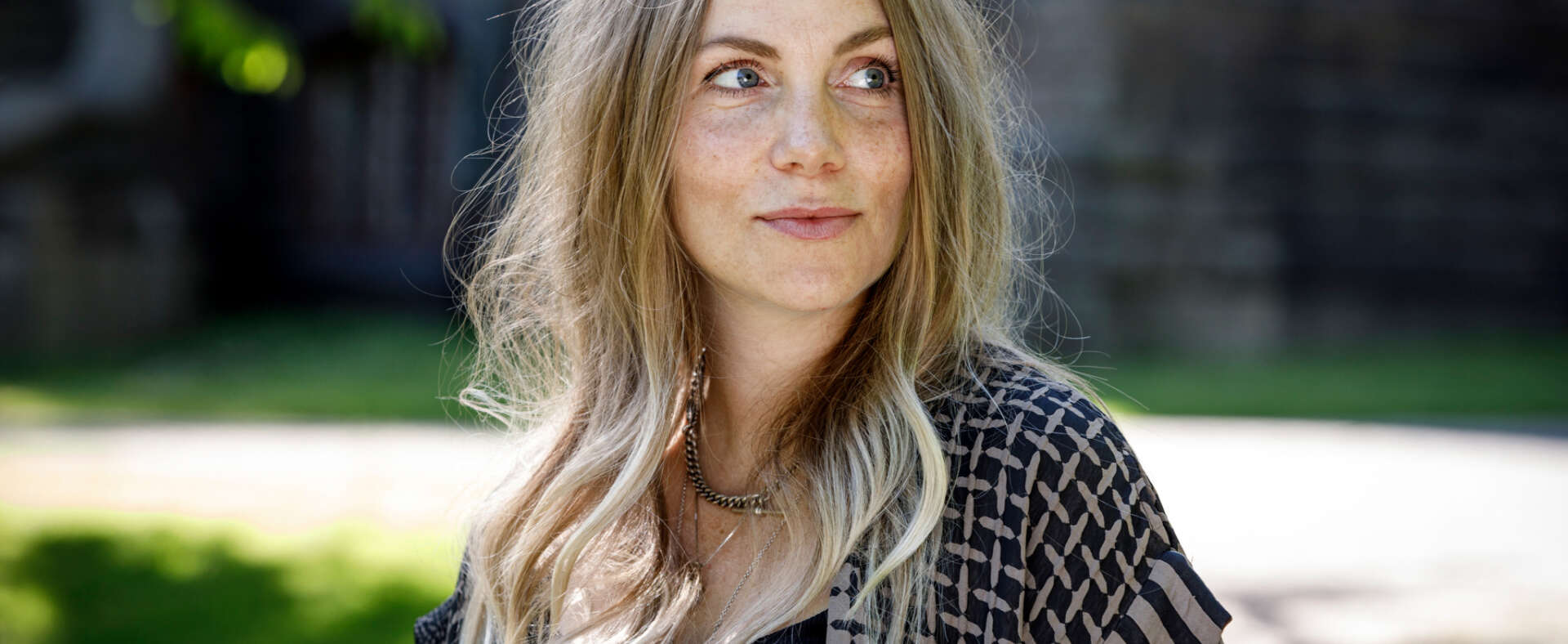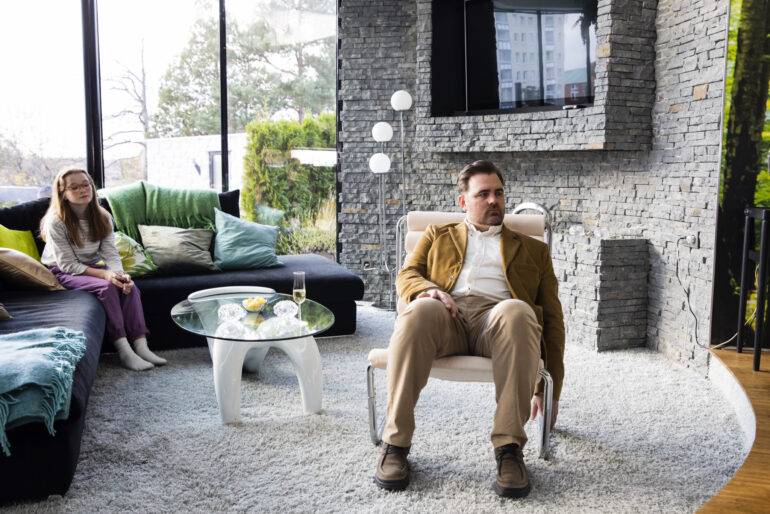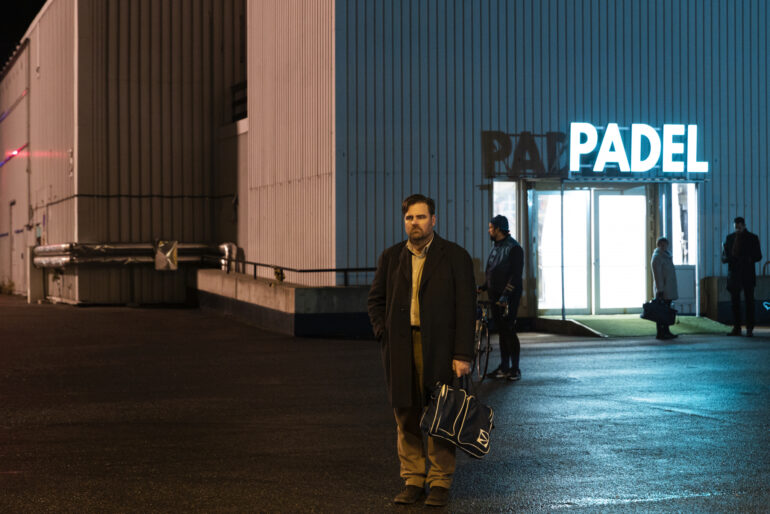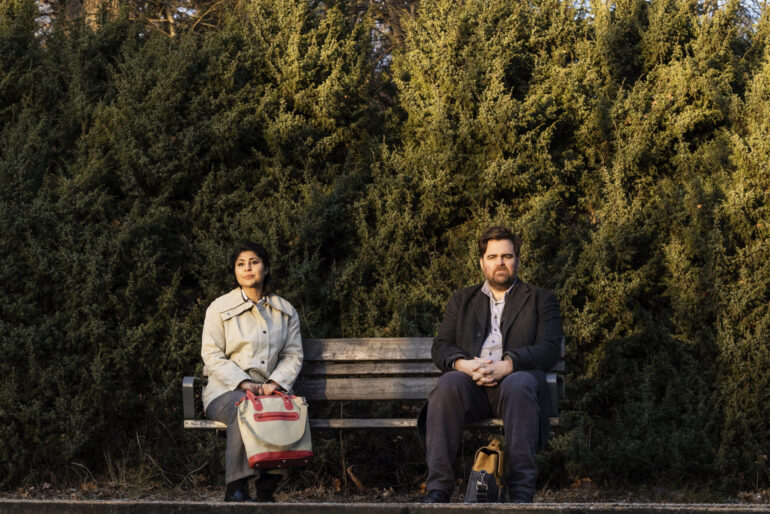
Tove Eriksen Hillblom, head-writer of Suburbia (Vi i Villa) discusses the Swedish satire produced by FLX for Discovery +/Kanal5.
Tove Eriksen Hillblom who studied advertising, media and communications, turned from copywriter to screenwriter. Over the past years, her work as episodic writer and head-writer of some of Sweden’s biggest series -Solsidan, Sjölyckan, has earned her several nominations at the Swedish Kristallen TV awards.
Nominated for outstanding screenwriting of a Nordic drama series Suburbia (Vi i Villa 6x30’) is a suburban satire, in which couples have endless conversations about home renovations, quality time, fitness, sustainability and shared family calendar. The main character Anders (Mattias Nordkvist) who works for a motivational agency and plays paddle tennis with his colleagues, is on the verge of a nervous breakdown. The tipping point for him is when he finds out his daughter is being bullied at school. Desperate in his yearning for change, he starts harassing his neighbours.
The cast also includes Sanna Sundqvist (Bonus Family, Call Mom!), Johan Widerberg (Bäckström, Spring Tide) and Helena Af Sandeberg (Quicksand, Dough).
The series is based on Hans Koppel’s best-selling novel ’Vi i villa’ (lit. ’We in the villa’) adapted for TV by head-writer Tove Eriksen Hillblom, with co-writers Henrik Schyffert and Maria Nygren. Schyffert serves as concept director.
The series produced by FLX’s Lejla Bešić, was supported by Nordisk Film & TV Fond.
The premiere on Discovery + is set for spring 2022.
What does it mean for you to be nominated for Best Nordic Screenplay with Vi i villa?
Tove Eriksen Hillblom: I feel super honoured and happy to get to be in such amazing company! It truly was such a joy to be in the writer’s room together with Henrik [Schyffert] and Maria [Nygren], and I’m so glad that what we sought out to create has been so well received so far.
Generally speaking, what type of stories are you drawn to?
THE: I love exploring different types of relationships and more specifically stories that stem from the characters’ inadequacies. The glitch between who we are and who we want to be is such great territory, because it’s a driving force for so much shame, lies and getting ourselves into really awkward situations. Which can be both hilarious and tragic, often at once.
When and how did you get into writing and TV screenwriting in particular?
THE: I started writing little short stories at the age of four or five, and have loved writing ever since. However, I didn’t really consider writing for TV or film as a career as it seemed like an impossible dream, something meant for others? So I got into advertising, eventually got sick of trying to arrange a caring face in meetings with insurance companies, and then had the opportunity to test write for a TV show. There really was no turning back after that.
Could you describe the core of the series, the main character Anders and narrative arc?
THE: Anders is a man who finds himself outrun by life. He has lost track of his dreams – not in a big, dramatic swoop – but little by little, day by day. He feels completely stuck in the charade that is middle-class adulthood and is sick of trying to fit into an existence he loathes. His marriage has lost its spark and he is constantly underachieving at his job as a booker for motivational speakers. Anders is on the outside, looking in, and constantly trying to connect, break through the façade, but it seems impossible.
The tipping point for him is when he finds out his daughter Anna is being ostracised at school and he starts harassing his neighbours as a means of revenge. It starts small, but the action sparks something inside Anders and he finds it impossible to stop. The sense of liberation is addictive and he soon finds himself completely caught up in lies both at home and at work. The pressure builds and it seems Anders is headed for inevitable disaster.
The stories of Anders and his daughter Anna are kind of parallel to one another and the emotional heartbeat of the series. Anders thinks he’s trying to save Anna, but really, he’s trying to save himself.
So it’s about what we do to fit in, the lengths we go to, and that maybe we can’t win until we just let it fall. Also, Anders’ job at the motivational speaker’s agency is kind of an allegory for the time we live in, where self-fulfilment and self-improvement is not only the new religion, but also an obligation. With all the possibilities in the world you owe it to yourself to live your best life, otherwise you’re kind of a loser.
In what way does the opening quote from Jackie Kennedy "You are only ever as happy as your unhappiest child" perfectly illustrate the show?
THE: I think it just sums up Anders’ love for his daughter; her unhappiness is what drives him towards change.
How did you work on Hans Koppel's book adaptation in the writers' room with Henrik and Maria? What were the biggest challenges?
THE: I think normally when adapting a book, one of the challenges is there’s too much material to fit on screen and you might have to edit out some things. With this, we had the opposite situation as the novel is quite short. Therefore, we had to develop some new storylines - Anders’ work among other things - and make it feel like it was all part of the story from the beginning. That was great fun, though! Luckily, we were able to discuss it with the book’s author who was extremely helpful and we have his blessing, haha.
What were your inspirations besides the book itself?
THE: The book was obviously our main inspiration and our aim was to create a filmic universe that would feel like its natural offspring, something both dark and quirky. In terms of other inspirations, I think Anders feels a bit like he’s stuck in a suburban The Matrix, trying to make sense of the world around him and oftentimes feeling like he’s the only one who can see the truth, the common charade we’re all a part of.
How did the cast contribute to their own characters? Were you on set to get inspired?
THE: We were so fortunate to get a group of incredible actors on board, all with their own life experiences to pour into their characters. I believe there was a lot of relatability to draw from here!
It’s always exciting to see what happens when what you’ve written gets filtered through other people, making it their own, doing things a bit differently-and better-than what you expected.
We finished writing a few months before shooting, so any set visits were purely for the joy of seeing some very brilliant people at work and trying not to get in the way while eating sandwiches!
Tell us about the series' visual style and the creative team's decision to break the 4th wall...
THE: The decision to break the 4th wall came from the fact that a lot of the book is an inner monologue, and we wanted to keep some of that. I also think it contributes to the sense of Anders as an observer. The visual style is kind of theatrical, like the life we’re portraying. Frida Wendel, our amazing cinematographer, not only makes every frame stunning to look at, but I also think her and Henrik elevated the humour a lot through their visual choices.
What's next for you?
THE: I’ve created a new series, co-developed and co-written together with Maria Nygren, which we’re about to start shooting within the next few weeks. I can’t really say much about it yet, but it’s a darkly funny dramedy that deals with the life expectations on women through the lens of fertility and motherhood. It’ll be super funny and super sad-my favourite combo!
Could you cite your 3 top TV dramas (Nordic or non-Nordic) that you've watched recently?
THE: Among other things, I’ve really enjoyed The Thin Blue Line, The Morning Show and, of course, Succession.


